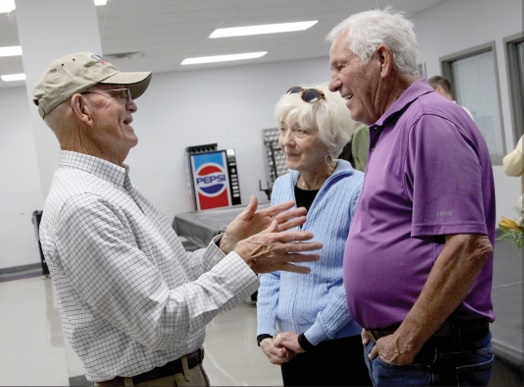Free sludge appeals to some local landowners
A handful of Barry and Newton County landowners traveled to Jefferson City to testify in support of the land application of Denali Water Solutions’ industrial-processing sludge at a Missouri Senate hearing on March 26.
Their testimony, along with that of Denali executive Rob Currey, was an attempt to convince senators to vote against proposed legislation that will more tightly regulate the storage and land-application of meat and other food-processing waste.
The landowners use the sludge, they say, because it is free.
“If I don’t have access to the [‘free fertilizer’], I can’t afford to operate my business,” one Newton County resident said.
Denali’s sludge, the property- owners say, has increased their grass yield and never harmed their land.
“Farmers would never do anything to hurt their own land,” one Wheaton-area landowner said.
That statement, while sincere, may be misguided. Because it is free, the contents of the sludge are not in question by the southwest Missouri landowners who use it.
According to the Environmental Protection Agency (EPA), meat and poultry processing effluent is one of the largest sources of industrial nutrient pollution in the country.
“Excessive nitrogen and phosphorus in surface water can lead to a variety of problems, including eutrophication and harmful algal blooms, which can have negative impacts on human health and the environment,” a December 2023 EPA fact sheet states.
According to geologists, a “dead zone” at the mouth of the Mississippi River in the Gulf of Mexico is the result of nutrient runoff from fertilizer applied in Iowa and other northern states.
This year, the EPA is proposing new guidelines which would establish more stringent effluent limitations for livestock slaughtering and meat rendering facilities nationwide. The new guidelines, if approved, are designed to reduce the pollutants – including nutrients – discharged in the wastewater from such facilities and would establish, for the first time, pretreatment standards for oil and grease, total suspended solids and biochemical oxygen demand.
For the first time, too, limitations would be established for phosphorus.
The proposed EPA limitations on phosphorus coincides with Currey’s concern about Missouri’s proposed regulations for sludge storage and application.
The combination of state and federal restrictions could result not only in a larger quantity of sludge to hauled, but also sludge with more pollutants, says industry insider William Wymore, of Owensville.
Currey singles out the restrictions on phosphorus as being “overly burdensome.”
“I’m all for the DNR regulating pollutants, but not nutrients,” he said. “If we [soil] test a [land application] field, and it’s too high in phosphorus, we’ll have to haul [our product] farther away, and it will drive costs up.”
The sludge that Denali and other companies haul, Wymore said, will likely contain higher amounts of phosphorus when (and if) the EPA restricts the amount of phosphorus being released in facilities’ wastewater.
“Processing facilities will also have to use more chemicals in the wastewater treatment in order to reduce the nitrogen and phosphorus content in their wastewater, so those additional chemicals will also be present in the sludge,” Wymore said.
The quantity of the sludge may increase, too, Wymore believes, and could leave companies like Denali with not only more sludge to transport, but sludge with a greater pollutant content.
Among other stipulations, legislation proposed by State Rep. Dirk Deaton, R-Noel, State Rep. Ed Lewis, R-Moberly, and Stater Sen. Jill Carter, R-Granby — under the name House Bill 2134 — calls for the monthly testing of basin contents for specific chemicals and nutrients by certified third-party labs, who report test results directly to the state.
A concern for some area residents is that not all of the sludge that Denali and other industrial waste-haulers propose to land-apply in southwest Missouri is generated in Missouri. In fact, the majority, as of June 30, 2023, was not.
According to a DNR spreadsheet on file as of July of last year, Denali held fertilizer permits in conjunction with 98 businesses it contracted with. Of those businesses, 63 operated in states other than Missouri.
Because of an abrupt change in fertilizer permitting requirements by the Missouri Fertilizer Control Board (MoFCB) in the first part of 2023, Denali and its competitors are no longer required to hold fertilizer permits. Responsibility for permitting the companies now falls under the auspices of the DNR. According to the DNR’s proposed permits, the names of the industries with whom the waste-haulers contract, and by whom the sludge is generated, will not be on file.
Vallerie Steele, who lives adjacent to a Denali storage lagoon in Newton County, is concerned.
“Nobody really knows what’s in the sludge being spread on the land,” she said.
Denali initially objected to court requests for the soil and content sampling of its storage lagoons in Newton and McDonald Counties, per a lawsuit initiated by citizens group SLUDGE, LLC against the DNR. Denali has since consented to the sampling.
SLUDGE is in the process of raising funding for that sampling and testing, Steele said. Interested parties can contribute to that effort through PayPal on the account @stopsludgespreading, which has the name “Korrie Bateman” associated with it.
For information about land-application of meat-processing waste in Barry and surrounding counties, the DNR is hosting an informational meeting on Thursda, from 10 a.m. to noon. People may join the meeting by Webex at the following webpage: https://tinyurl. com/yz7x3t66. Interested parties may also attend in person at the Lewis and Clark State Office Building, Gasconade Camp conference room, 1101 Riverside Drive, Jefferson City. Due to limited seating capacity, Webex participation is encouraged.
The deadline for public comments on the spreading of biosolids in Barry County is April 15.
The deadline for public comments on meat-processing sludge spreading in Barry and McDonald Counties by Synagro Central and HydroAg Environmental is April 21. Proposed permit information can be found at: https:// dnr. mo. gov/ calendar/event/251416, https://dnr.mo.gov/calendar/ event/251426 and https://dnr. mo.gov/calendar/ event/254136.




